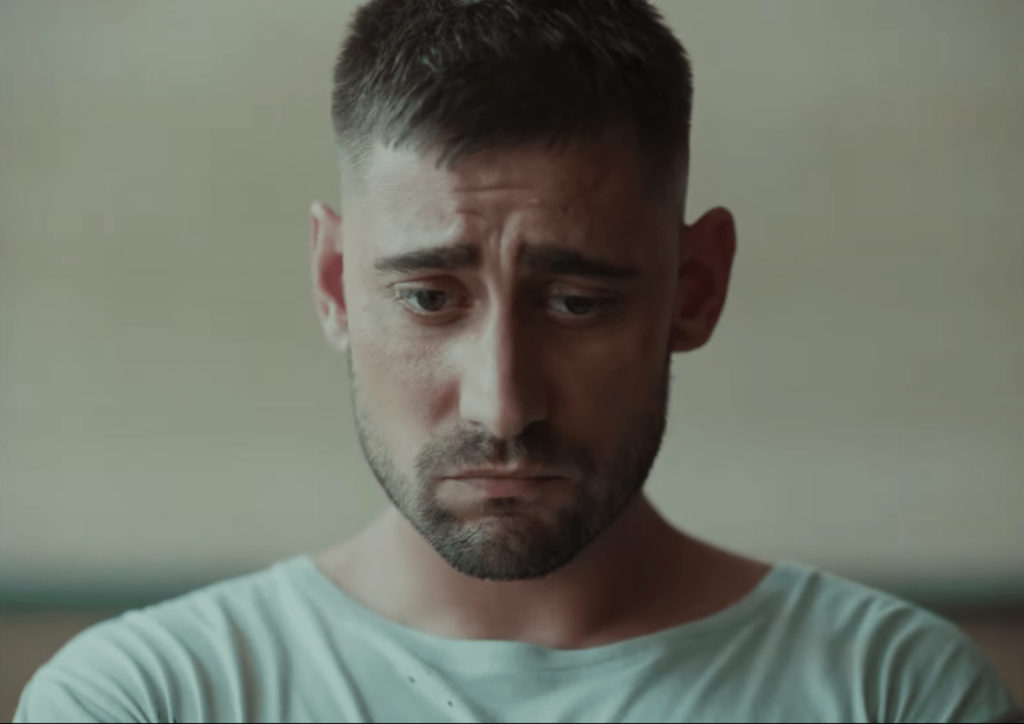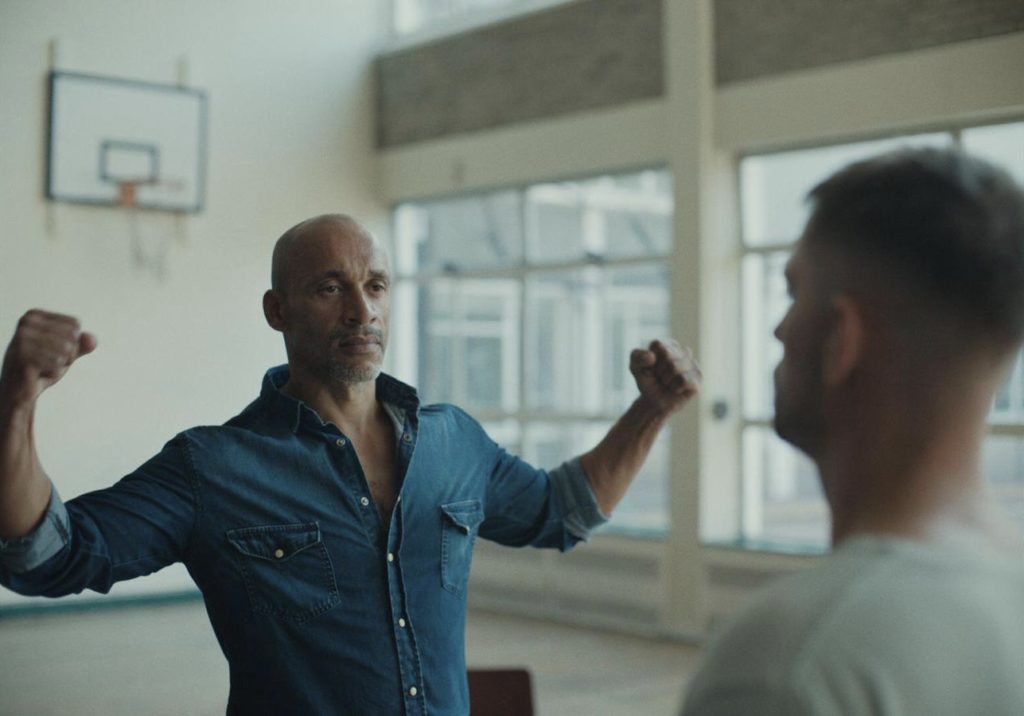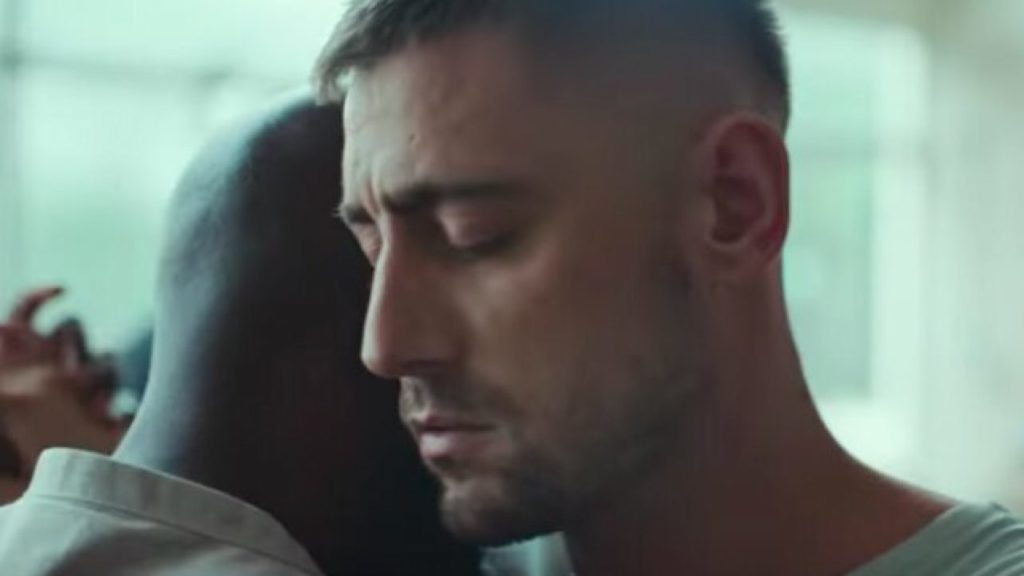
Social isolation has reduced the space between us and where we fall short, providing some particularly uncomfortable close-ups. That includes the part of masculinity that’s depressing and harmful to men before it’s toxic to anybody else.
Elderbrook is the stage name of the English musician, songwriter, producer and singer behind a remarkable 4-minute music video that has, over the past year, invited millions of us to consider the emotional isolation of men who show up for a group therapy session because they know they have a problem (but not what to do about it) until somebody in the group finds the courage to break their isolation.
Elderbrook wrote the mesmerizing music and vocalizes the lyrics, which are about the absence of companionship when something bad is happening to you, that is, when someone who’s not there when you need them might have helped “in keeping me sober.” For the flow and rhythm of the interactions between the ensemble of characters, Elderbrook’s voice is accompanied by an electronic music collective called Rudimental, which is a big deal in Britain but mostly under the radar here.
The gifted director who visualized the narrative is Luke Davies, the choreography (that fits this assortment of clueless blokes to a tee) is by Jacob Holme, and the lead actor is Michael Socha, who is pictured above and plays his part throughout with a non-comprehending beauty. All of these elements come together in a mix of throb, gut-punch and whimsy that speak with terrific economy to how utterly alone men can be and what needs to happen before we do something about it.
I found it jaw-dropping.
+ + +
Here’s how the video opens:
You’re about to enter some kind of group dynamic where you’re expected to contribute—a meeting, a book group, a seminar room with limited students—and a big part of you “would just rather not today.”
They’ll want me to open up, show who I am, know what I’m talking about, have something to say, share.
Call it performance anxiety, because all things considered, on most days I’d rather not.
And because it’s a group therapy room for just men, it’s even harder.
You come to deal with whatever’s been going on with drugs, alcohol, depression or just being messed-up, and it can get pretty personal.
I don’t want to look at the stain in my drawers let alone his drawers!
Maybe they’ll want me to make some gesture at taking care of one of my fellow losers. Or maybe, one of them will want to start doing that [shi~ver] to me.
They always said, “you’re not good with emotions,” that you keep what’s hurting you at bay or push it down.
Yeah, it is pretty thin ice. I might fall through and keep falling, so I hold on to the brittle however angry or irritable I get when it’s tested, or beat myself up with only a beer for sympathy, so I suppose they’re right.
What good is anybody in here for that?
And besides, they’ll be holding a pretty sad safety net.
So the first thing I’ve got to do is get it up to walk in the room with the rest of ’em instead of bolting for the stairs.
Today, it’s a long hesitation but I decide to step in anyway, and suddenly I find myself in a silence of furtive eyes, waiting for the so-called therapy to start and the first shoes to drop.
The boss starts canvassing for volunteers. “Who wants to go first? Do you Kevin? Michael?”
Then I hear some background music and, against all odds, it’s my feet that want to start talking.
I stand up like the prototype man, like Popeye—making arm muscles with both hands next to my shoulders to show how strong I either am or not, while shuffling a bit tentatively.
And then I’m off.
+ + +
Here’s your link to the “Something About You” music video. Watch it now if you can. Then think about it for a minute or two and maybe watch it again.
I can’t get over it, and maybe you’ll feel the same—particularly that part when two men make cautious eye contact and start to approach one another, and maybe you’re feeling some of the anxiety our culture has taught us that something “forbidden” or at least “not quite right” is about to happen.
Call it Taboo. Call it an acknowledgement of vulnerability. Call it one of many insights in a startling stream of them.

After he wrote and recorded “Something About You,” Elderbrook sent it out to film directors to get bids on content for the video. The request mentioned the summery nature of the track, but Luke Davies (who went on to win the bid) also heard a melancholy sadness, and “after listening to the song for an hour and a half” came up with the inspiration for a men’s self-help group (as he recounted in an interview after the music video went viral). Never really imagining that Elberbrook and his team would go for any of it, Davies had always wanted to make a short film that included line dancing “as a kind of metaphor for something else,” so he built dancing into his bid as well. And then there was this final association:
I always think of cowboys and for me, cowboys are an archetypal symbol for men. I think of Clint Eastwood and all these Hollywood archetypal superheroes before there were superheroes.
True creativity is always a leap into the dark, and Elderbrook ended up loving where Davies wanted to take his song.
Interestingly, after the performers were hired and the “cowboy” rehearsals had begun, Davies dropped on the actors that there would not only be line dancing but also “slow dancing,” and, for all the obvious reasons, he was worried about their reactions. This is how he describes what happened next, and (given the theme) the reality in that room was pretty magical in its own right.
The whole day, without a doubt, was one of the most satisfying and enjoyable shoots of my life. I gotta admit, all the dancing was so much fun to do, especially the slow dancing on rehearsal day, because the actors had no idea it was going to be a part of the music video.
They knew there was going to be line dancing but I hadn’t told them they were going to be slow dancing. And these guys had only met each other a couple hours ago. I was like ‘right, ok so everyone stand in the middle of the room, here are your partners, now I just want you to sort of hug each other’. They hugged each other for about a minute. And once we had done that and got the awkwardness out of the way, we just started slow dancing for a bit.
And what was weird is that I thought that people might be funky or not take it seriously and be embarrassed but straight away, people were just so emotional leaning into each other and it was quite romantic and funny seeing a bunch of blokes slow dancing.
You can see how well it turned out, but in some ways the story behind this little film was just beginning. The choreographers posted a how-to-do-the-line-dance instructional video on You Tube shortly after “Someone Like You” began to attract attention, and it beautifully reinforced the overall simplicity of the message: This isn’t so hard to do. And then, all of a sudden, there were young men dancing to it in a “Together is Stronger” challenge on TikTok.
Because men who let their guards down together really do become stronger.

Negative emotions eat away at you when they don’t get out, and men often have a harder time than women getting them out. No one denies it. It’s society’s, your parent’s, your own advice to “just suck it up,” to put your negative feelings behind you or bury them deep inside instead of working (even dancing) your way through them.
For example, depression is a self-aggression of trapped emotions that tends to reinforce its isolation at every turn—with booze, drugs and even deeper withdrawals. Ultimately, the answer is putting the pain into words. (If you’re interested in the deep scholarship behind this, I’d recommend Dr. Judith Herman’s landmark Trauma and Recovery.) Unfortunately, there haven’t been many translators–between the medical community and the rest of us–who have talked about men’s particularly constricted side of it, at least in vivid voices that make both the problem and its possible solutions come alive.
Davies, the director, was aware of all that because he saw the problem in men from his own family and suspected that it had to exist everywhere.
There is basically a group of people that needs our help and support [but isn’t getting it]. The bigger idea that we’re exploring is masculinity and within that, the unrealistic standards I think society sets for men. You only need to look at mental illness, depression and suicide numbers among young men to see how much of an issue it is and I think part of that has to do with the fact that men find it difficult on the whole to talk feelings.
Some people have seen [the video] as like an attack on toxic masculinity, which for me it’s never been about. I know toxic masculinity exists and I do think it needs to be discouraged but at the same time, I think people who are most guilty of it are also kind of the victims of this idea of not being able to talk about emotions and being vulnerable.
In other words, men can be as toxic to themselves as they can be to others, and maybe that’s the root of the problem.
Elderbrook and Davies have told at least part of this story about men and their feelings brilliantly, economically and interactively. They’ve shone a light. And who would have thought that they’d do so by inviting us to slow dance.
This post was adapted from my March 21, 2021 newsletter. Newsletters are delivered to subscribers’ in-boxes every Sunday morning and occasionally I post the content from one of them here. You can subscribe too by leaving your email address in the column to the right.
Leave a Reply